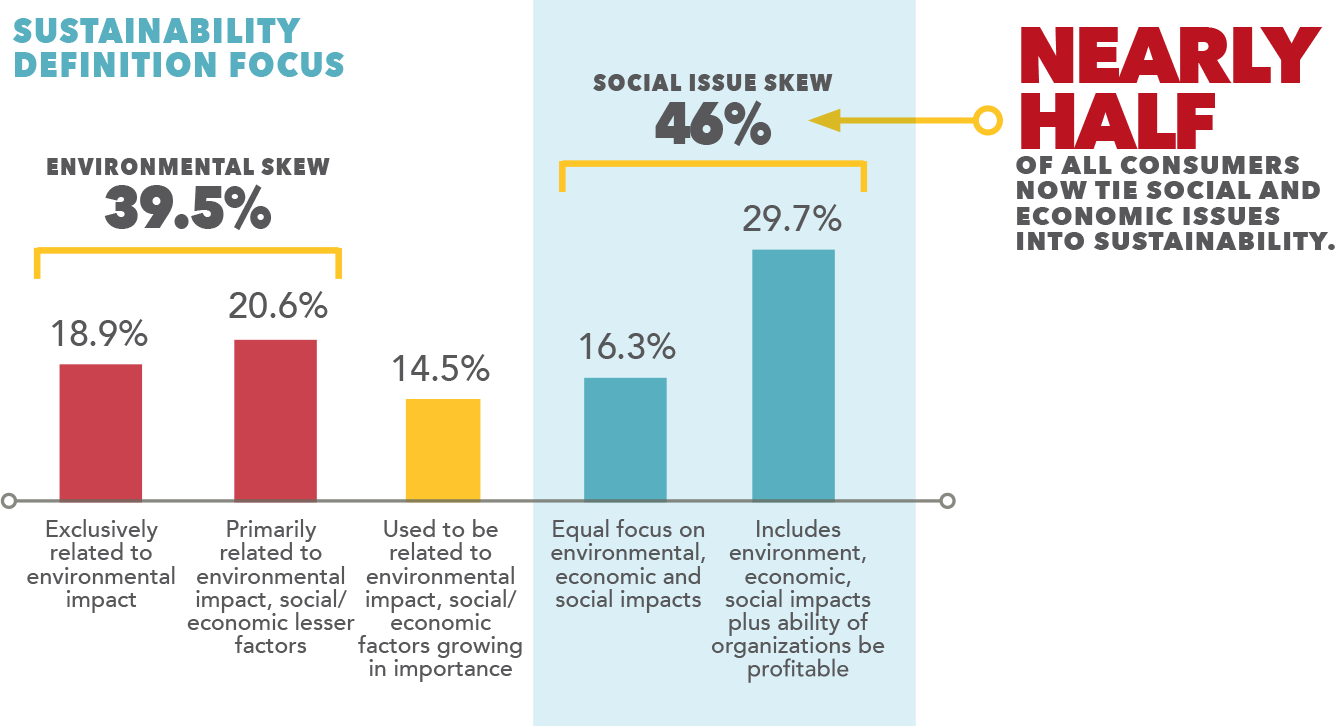So you’ve created your corporate sustainability report. In it you’ve outlined the extensive efforts you’ve committed to in order to be responsible stewards of our resources. You resolve to use less water, incorporate recycled materials and produce fewer emissions—all noble and important actions. But for today’s consumers—as well as many partners and investors—that may no longer be enough. Sustainability is now just as much about people as it is the planet.
In our recent consumer report distributed in partnership with Menu Matters, nearly half of all consumers (46 percent) now tie social and economic issues into sustainability. Issues like affordable food for all (41.5 percent), fair wages (31 percent) and social justice (18.4 percent) are increasingly becoming part of people’s definitions of sustainability.

These findings are in line with the UN Sustainable Development Goals. Among traditional efforts focused on issues like clean water, responsible consumption and climate action, you’ll find goals related to poverty, gender equality, reduced inequalities, peace and justice. This all points to a future where consumers will want to know how your organization treats employees and contributes to social justice as much as they want to know that your product is made environmentally responsibly.
What consumers want to know.
As with nutrition and environmental sustainability, the short answer is everything. But it’s important to communicate in your messaging and/or CSR report your efforts—and the efforts of those in your supply chain—in a few key areas:
- Racial and gender diversity
- Equitable treatment of employees including fair wages, harassment-free environments, advancement opportunities, the right to unionize, etc.
- How the wages of your general employees compare to wealth of ownership and c‑suite
- Ingredients and materials sourced in ways that do not exploit child or slave labor or any other undesirable working conditions
- In some cases, the specific stance your company takes on a certain issue
What you can do.
- Be aware. Realize that the world is constantly changing at an increasingly rapid pace, and consumer expectations are going to continuously shift. Reevaluating your CSR efforts should happen more often than when it’s time to deliver your annual report. Keep your finger on the societal pulse and constantly audit yourself to ensure your products and processes are in line with consumer expectations.
- Be strategic about how you communicate your efforts. Consumers want to know that you’re operating responsibly, but there is the danger of information backfiring if not done carefully. For example, in 2018 Budweiser faced criticism after they bought a $5 million Super Bowl ad to brag about donating $200,000 worth of water. Consumers are smart, and only getting smarter. Consider partnering with a communications agency to help you develop a plan for how and when to demonstrate your sustainability progress.
- Be ready. As much preemptive work as you’re doing to be responsible, you just can’t predict when the tide is going to shift. All it takes is one tragic societal injustice or one wayward employee within your organization to make a bad decision and everything can change. The only way to prepare for the unpredictable is to make sure you have the right team in place to act when the world changes. Make sure you have a crisis communications team at your disposal to navigate the rockiest of roads and to help set a course for long-term CSR messaging.
C.O.nxt Insight
Our team of subject matter experts focuses on food and agriculture—farm field to processing to entrée on a plate. We can help you build a CSR and sustainability plan and platform that resonates with today’s consumer. Let’s talk when the time is right to handle your next strategic marketing and communications challenge: Marcy Tessmann, marcy@co-nxt.com.
C.O.nxt Insight.
Our team of subject matter experts focuses on food and agriculture—farm field to processing to entrée on a plate. We can help you build a new brand, protect an old one or target customers to foster sales. Let’s talk when the time is right to handle your next strategic marketing and communications challenge: Marcy Tessmann, marcy@co-nxt.com.
SHARE THIS STORY
What Would You Solve in 30 Days?
Every brand faces moments when clarity, momentum, or alignment are lacking. Sometimes it’s a new product that needs a smart go-to-market plan. Other times, it’s a shift in the business that calls for a tighter
